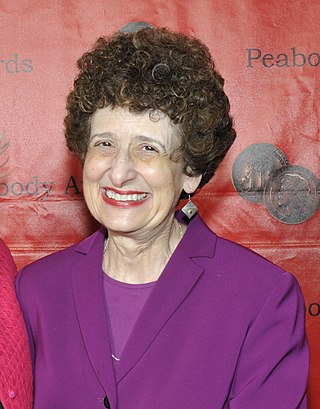
Janet Horowitz Murray is an American professor in the School of Literature, Media, and Communication at the Georgia Institute of Technology. Before coming to Georgia Tech in 1999, she was a Senior Research Scientist in the Center for Educational Computing Initiatives at MIT, where she taught humanities and led advanced interactive design projects since 1971. She is well known as an early developer of humanities computing applications, a seminal theorist of digital media, and an advocate of new educational programs in digital media.

David A. Bader is a Distinguished Professor and Director of the Institute for Data Science at the New Jersey Institute of Technology. Previously, he served as the Chair of the Georgia Institute of Technology School of Computational Science & Engineering, where he was also a founding professor, and the executive director of High-Performance Computing at the Georgia Tech College of Computing. In 2007, he was named the first director of the Sony Toshiba IBM Center of Competence for the Cell Processor at Georgia Tech.
Jay David Bolter is the Wesley Chair of New Media and a professor in the School of Literature, Media, and Communication at the Georgia Institute of Technology. His areas of study include the evolution of media, the use of technology in education, and the role of computers in the writing process. More recently, he has conducted research in the area of augmented reality and mixed media. Bolter collaborates with researchers in the Augmented Environments Lab, co-directed with Blair MacIntyre, to create apps for entertainment, cultural heritage and education for smart phones and tablets. This supports his theory regarding remediation where he discusses "all media functions as remediators and that remediation offers us a means of interpreting the work of earlier media as well".
The terms design computing and other relevant terms including design and computation and computational design refer to the study and practice of design activities through the application and development of novel ideas and techniques in computing. One of the early groups to coin this term was the Key Centre of Design Computing and Cognition at the University of Sydney in Australia, which for nearly fifty years pioneered the research, teaching, and consulting of design and computational technologies. This group organised the academic conference series "Artificial Intelligence in Design (AID)" published by Springer during that period. AID was later renamed "Design Computing and Cognition (DCC)" and is currently a leading biannual conference in the field. Other notable groups in this area are the Design and Computation group at Massachusetts Institute of Technology's School of Architecture + Planning and the Computational Design group at Georgia Tech.
The College of Design at the Georgia Institute of Technology, established in 1908 as the Department of Architecture and also formerly called the College of Architecture, offered the first four-year course of study in architecture in the Southern United States.
The Ivan Allen College of Liberal Arts is a college of the Georgia Institute of Technology, a public research university in Atlanta, Georgia. It is one of the six academic units at the university and named for former two-term Atlanta mayor Ivan Allen Jr., a Georgia Tech alumnus and advocate for the advancement of civil rights in America.

The Georgia Tech Library is an academic library that serves the needs of students, faculty, and staff at the Georgia Institute of Technology. The library consists of the S. Price Gilbert Memorial Library and Dorothy M. Crosland Tower. In addition, the library is connected to and manages the Clough Undergraduate Learning Commons.

Amy Susan Bruckman is a professor at the Georgia Institute of Technology affiliated with the School of Interactive Computing and the GVU Center. She is best known for her pioneering research in the fields of online communities and the learning sciences. In 1999, she was selected as one of MIT Technology Review's TR100 awardees, honoring 100 remarkable innovators under the age of 35.
The School of Interactive Computing is an academic unit located within the College of Computing at the Georgia Institute of Technology. It conducts both research and teaching activities related to interactive computing at the undergraduate and graduate levels. These activities focus on computing's interaction with users and the environment, as well as how computers impact the quality of people's lives.

Annie Antón is an academic and researcher in the fields of computer science, mathematical logic, and bioinformatics.
Elizabeth D. "Beth" Mynatt is the Dean of the Khoury College of Computer Sciences at Northeastern University. She is former executive director of the Institute for People and Technology, director of the GVU Center at Georgia Tech, and Regents' and Distinguished Professor in the School of Interactive Computing, all at the Georgia Institute of Technology.

Guy Primus, is an American entrepreneur and inventor. He is chief executive officer of Valence Enterprises, and is a member of the Board of Trustees of Southern California Public Radio. He is also the chairman emeritus of the School of Industrial and Systems Engineering advisory board at Georgia Tech. Born in Pittsburgh, Pennsylvania, he grew up in a middle-class neighborhood. After graduating from Penn Hills High School, he attended Georgia Tech, earning a BS in Industrial Engineering in 1992 and an MS in Industrial Engineering in 1995. He graduated from Harvard Business School in 2000. He is also a member of Kappa Alpha Psi fraternity.
Carol A. Senf is professor and associate chair in the School of Literature, Media, and Communication at the Georgia Institute of Technology. With four books, two critical editions, one edited essay collection, and various critical essays, she is a recognized expert on the biography and works of Irish author Bram Stoker. She received the Lord Ruthven Award in 1999.
Richard Johann Utz is a German-born medievalist who has spent much of his career in North America. He specializes in medieval studies, and served as president of the International Society for the Study of Medievalism (2009–2020).

Michael L. Best is an American computer scientist and international development specialist. He is professor at the Georgia Institute of Technology where he holds a joint appointment with the Sam Nunn School of International Affairs and the School of Interactive Computing. He is Executive Director of the Institute for People and Technology(IPaT) and Director of the Technologies and International Development Lab. Best served as founding director of the United Nations University Institute on Computing and Society established in 2015.
EarSketch is a free educational programming environment. Its core purpose is to teach coding in two widely used languages, Python and JavaScript, through music composing and remixing. This learning environment was developed first at Georgia Institute of Technology, under Prof. Jason Freeman and Prof. Brian Magerko.

Kathy Pham is a Vietnamese American computer scientist and product management executive. She has held roles in leadership, engineering, product management, and data science at Google, IBM, the Georgia Tech Research Institute, Harris Healthcare, and served as a founding product and engineering member of the United States Digital Service (USDS) in the Executive Office of the President of the United States at The White House. Pham was the Deputy Chief Technology Officer for Product and Engineering at the Federal Trade Commission, and the inaugural Executive Director of the National AI Advisory Committee.
Joycelyn Wilson is an assistant professor of hip hop studies and digital humanities in the Black Media Studies cohort, located in the school of literature, media, and communication in the Ivan Allen College at the Georgia Institute of Technology. As an educational anthropologist, Wilson is an expert in African-American music and performance - with particular interests in contemporary modes of cultural production in the American South and Hip Hop in general, as well as their broad impact on higher education. She is also the founder and CEO of the HipHop2020 Archive and Innovation Lab, an educational resources design studio inspired by the Hip Hop Archive.
The School of Electrical and Computer Engineering (ECE) at the Georgia Institute of Technology, is an academic institution specializing in electrical and computer engineering education, research, and innovation. Located in Atlanta, Georgia, the school offers degree programs in Electrical engineering and Computer engineering that are accredited by ABET. It is one of the largest departments under the Georgia Institute of Technology College of Engineering.
The Daniel Guggenheim School of Aerospace Engineering at the Georgia Institute of Technology, is an academic institution specializing in aerospace engineering education, research, and innovation. Located in Atlanta, Georgia, the school offers degree programs in Aerospace engineering that are accredited by ABET. It is a department under the Georgia Institute of Technology College of Engineering.







